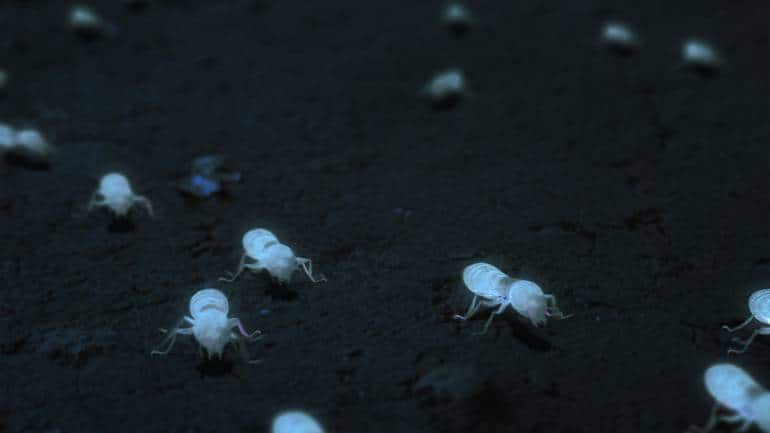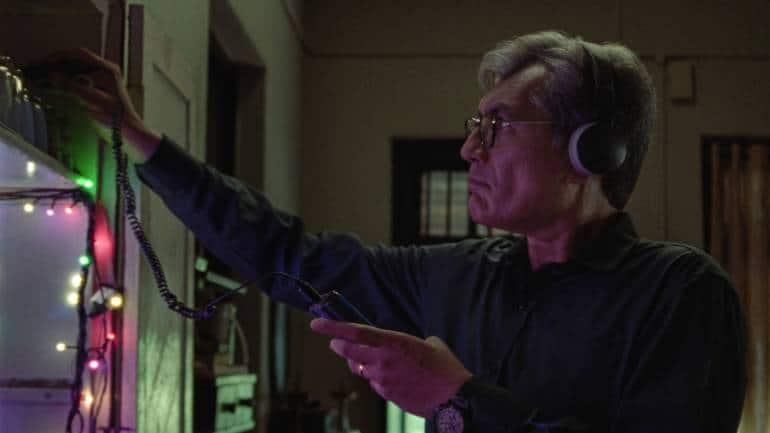Director Shalini Adnani and stills from her shot film White Ant, premiering at Sundance Film Festival 2023. (Images courtesy Sundance Institute))
Shalini Adnani dreamt up the glowing termites that take over her short film White Ant over the course of a few sleepless nights. They become a symbol of the war time wages on one’s possessions and, ultimately, on one’s sense of the past.
The film’s protagonist finds his childhood home on its last legs after he is summoned from Mumbai to his village to deal with a termite attack. It was in a near-hypnotic state, between rest and reality, that the filmmaker remembers being inspired to examine this disquiet between the traditional and the modern.
 Chilean-Indian filmmaker Shalini Adnani. (Photo: Ralph Whitehead | Courtesy of Sundance Institute)
Chilean-Indian filmmaker Shalini Adnani. (Photo: Ralph Whitehead | Courtesy of Sundance Institute)
For Adnani, a Chilean-Indian who currently lives in London, home is an ever-shifting concept. White Ant, which is premiering in the Short Film Program 3 section at the 2023 Sundance Film Festival, January 19-29, is her first short film set in India. In this interview, she talks about its making. Edited excerpts:
Themes of homecoming, memory, decay come through in your synopsis. Was there a particular moment or incident that inspired White Ant?
The idea of homecoming has been embedded in my life from childhood. My identity was always fractured, growing up in Chile, spending my summers in India, and speaking English at home. Visiting India every summer and returning to Chile were both homecomings for me. One more rooted in traditions and culture and the other one built on the idea of opportunity and possibilities. The main inspiration came from watching my ancestral home in India slowly become abandoned as the concept of a 'family home' disappeared and everyone splintered off into their own nuclear families or moved away, yet there was a hesitance to let go of the family home. So, instead of it being sold or inhabited by someone else, it remained abandoned, almost frozen in time, as a memory of our family home and the traditions that used to bind us together. This is something that's quite common in India today, as shifting values around family are changing the way people live.
Please tell us about the ants themselves. How were they brought to life?
The ants were animated by Brian King at Three Wise Monkeys Studio. I always wanted them to feel otherworldly, metallic, and iridescent and juxtapose them with the nostalgic environment and feel of the film. I was intrigued by contrasting tradition and modernity and playing with the audience's concept of historical time. We started off with a composite of the ants and then fine tuned them after we shot the film. It was a meticulous process that we weren't sure would work to be honest, but I love the final result.
 A still from 'White Ant' by Shalini Adnani, an official selection of the Shorts program at the 2023 Sundance Film Festival. (Photo: Brian King | Courtesy of Sundance Institute)
A still from 'White Ant' by Shalini Adnani, an official selection of the Shorts program at the 2023 Sundance Film Festival. (Photo: Brian King | Courtesy of Sundance Institute)
As a Chilean-Indian, what has the experience of making films in India been like for you? What are the themes you find yourself drawn to in India?
Working in India was incredible for me. Although I spent a lot of time here as a child, it remained fairly sheltered. The shoot allowed me to understand the working pace and meet a plethora of local talent. I felt incredibly blessed to meet so many talented people and have the chance to collaborate. There’s really interesting work coming out of this generation of Indian filmmakers and it feels exciting to experience it.
Themes of home, family and identity are inherently embedded into my work due to my background, but I am also drawn to themes of gender, technology in rural spaces, and the metaphysical.
What were some challenges in shooting White Ant?
White Ant was shot in Mumbai. Although our intention was to shoot in rural Maharashtra, we ended up finding a location within the confines of Mumbai that felt rural but allowed us to work with a Mumbai-based crew. Challenges while shooting the film affect many productions in Mumbai, sound in particular. It's a busy and noisy city, so trying to make things sound small and intimate was a challenge for sure. We also shot on 16mm which meant we had to be much more intentional with our shots and rehearse various times beforehand. This also meant the crew had to adjust to a different shooting style and pace of working. I decided to shoot on film because I wanted to aesthetically juxtapose traditional and modern but I also think the working style of shooting on film suits me better. It makes me a more disciplined and focused director.
You've found actors using Tinder in your earlier films. What was the approach to casting for White Ant?
I think it's just a great tool for street casting. I use Instagram more these days and I think various casting directors use social media to find raw talent. It depends on the project, for a project with teenagers, Instagram is a great tool, whereas Tinder and dating apps can be very helpful for people in their 20s or 30s. For White Ant, our casting process was a little more traditional. We knew we were going to work with Denzil (Smith) and then found the rest of our cast from local theatre communities. In fact, the only person that had performed on film previously was Denzil. Sushant, who plays the termite inspector, is a theatre actor and this is his on screen debut.
 Denzil Smith in a still from 'White Ant' by Shalini Adnani. (Photo: Adric Watson | Courtesy of Sundance Institute)
Denzil Smith in a still from 'White Ant' by Shalini Adnani. (Photo: Adric Watson | Courtesy of Sundance Institute)
Please tell us about Kollam, your India-set feature. Which of your experiences did you access for that story?
Kollam is a film inspired by my summers spent in India with my extended family. It’s a film that examines the meaning of family in India and the diaspora and is set in the backdrop of illegal sand-mining, which is a crisis that is particularly affecting India as sand has become a valuable commodity with the rise of construction and development.
For this story, I wanted to examine my coming-of-age experiences.